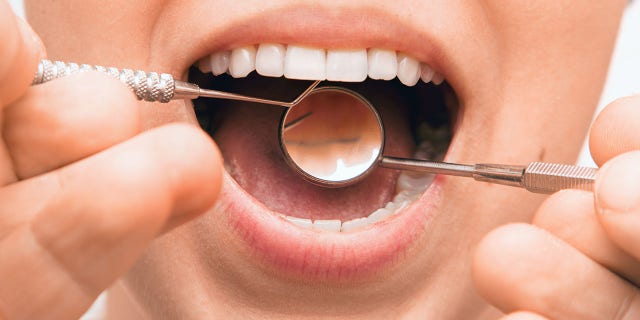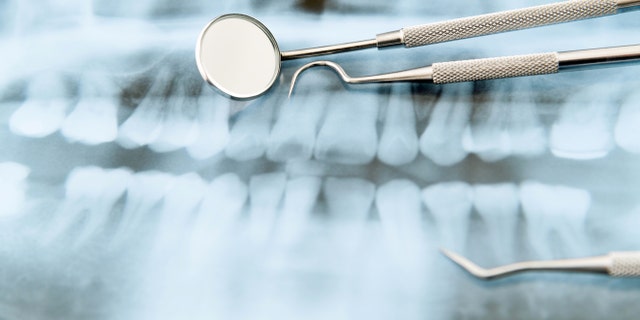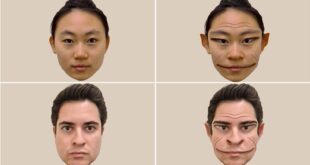
New research published in the journal Neurology suggests that brushing your teeth boosts the brain — helping to reduce the risk of dementia.
People with good dental hygiene had more neurons in the hippocampus, the study found; the hippocampus plays a role in memory.
Gum disease and tooth loss were linked with less gray matter and declining mental health.
THESE ARE THE WORST HEALTH MISTAKES YOU CAN MAKE WITH YOUR TEETH
These findings have clinical implications as regular visits to the dentist may help prevent Alzheimer’s, scientists pointed out.
Said lead author Dr. Satoshi Yamaguchi, of Tohoku University in Japan, “Tooth loss and gum disease, which is inflammation of the tissue around the teeth that can cause shrinkage of the gums and loosening of the teeth, are very common,” SWNS, the British news service, reported of the findings.

“These results highlight the importance of preserving the health of the teeth and not just retaining the teeth,” said the lead author of a new study. “The findings suggest retaining teeth with severe gum disease is associated with brain wasting,” he also said. (iStock)
“So evaluating a potential link with dementia is incredibly important,” he also said.
“Our study found these conditions may play a role in the health of the brain area that controls thinking and memory — giving people another reason to take better care of their teeth.”
BE WELL: FLOSS YOUR TEETH DAILY FOR BETTER HEART HEALTH
Chewing boosts blood and oxygen flow to the head — keeping the brain healthy.
Tooth loss may also lead to unhealthy eating.
For those with mild gum disease, fewer teeth was associated with a faster rate of brain shrinkage in the left hippocampus.
Gum disease is caused by inflammation of tooth-supporting tissues. It affects about one in seven adults.
The study involved 172 Japanese participants whose average age was 67; they did not have memory problems at the outset.

Gum disease is caused by inflammation of tooth-supporting tissues. It affects about one in seven adults. (iStock)
For those with mild gum disease, fewer teeth was associated with a faster rate of brain shrinkage in the left hippocampus — key for remembering words and language.
The same phenomenon was identified in those with severe gum disease and more teeth.
Said Dr. Yamaguchi, “These results highlight the importance of preserving the health of the teeth and not just retaining the teeth. The findings suggest retaining teeth with severe gum disease is associated with brain wasting.”
DENTISTS REVEAL WHY YOU SHOULDN’T BRUSH YOUR TEETH IN THE SHOWER
He also said, “Controlling the progression of gum disease through regular dental visits is crucial, and teeth with severe gum disease may need to be extracted and replaced with appropriate prosthetic devices.”
In mild and severe gum disease, one less or one more tooth was equivalent to nearly one year and 1.3 years of brain aging, respectively, the study noted.
Participants underwent dental exams and memory tests.

For each participant in the study, the researchers counted the number of teeth and checked for gum disease by looking at periodontal probing depth. (iStock)
They also had brain scans to measure the volume of the hippocampus at the beginning of the study — and again four years later, as SWNS reported of the results.
For each participant, researchers counted the number of teeth and checked for gum disease by looking at periodontal probing depth, a measurement of the gum tissue.
Healthy readings are from one to three millimeters.
AI HELPS DENTISTS CATCH MORE CAVITIES AND GUM DISEASE: IT’S ‘UNBIASED’ AND GIVES MORE ACCURATE DIAGNOSES
Mild gum disease involves probing depths of three or four mms in several areas, and severe gum disease five or six mms as well as more bone loss.
It can cause teeth to become loose and eventually fall out.
More study needed
Dr. Yamaguchi said future studies are needed with larger groups of people.
Last year an international study of more than a million people found those with poor dental hygiene were 21% more likely to develop Alzheimer’s.

Participants in the new study underwent both dental exams and memory tests. Future studies are needed with larger groups of people, said the lead author. (iStock)
Previous studies linked gum disease to diabetes and cardiovascular illnesses. It can even lead to chronic systemic inflammation.
CLICK HERE TO SIGN UP FOR OUR HEALTH NEWSLETTER
The new study does not show causation between gum disease or tooth loss and Alzheimer’s disease; it only shows an association.
Currently over 55 million people have dementia worldwide, according to the World Health Organization, with over 60% living in low-and middle-income countries. Every year, there are nearly 10 million new cases.
Dementia results from a variety of diseases and injuries that affect the brain, the WHO also notes on its website.
CLICK HERE TO GET THE FOX NEWS APP
Alzheimer disease is the most common form of dementia and may contribute to 60–70% of cases.
Dementia is right now the seventh leading cause of death and one of the major causes of disability and dependency among older people globally, the WHO says.

 Latest Breaking News Online News Portal
Latest Breaking News Online News Portal




